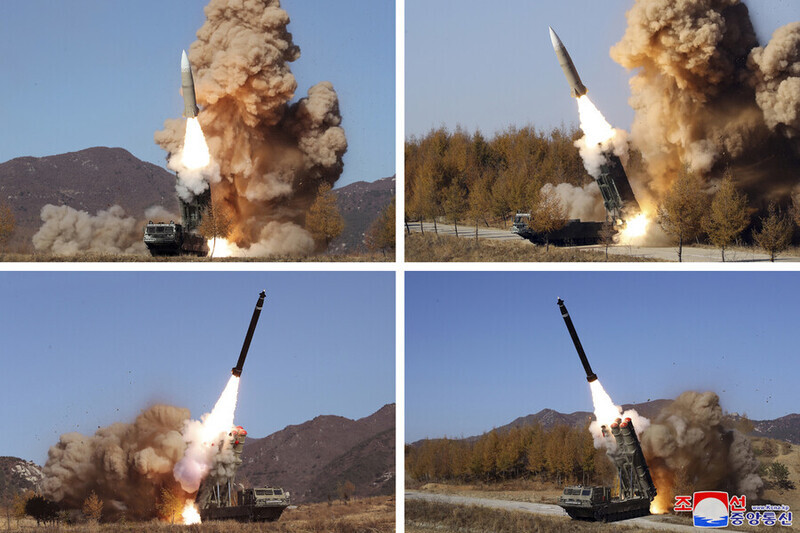hankyoreh
Links to other country sites 다른 나라 사이트 링크
[Column] Peace isn’t war for Korea


“Three months of war would cause the death of 52,000 American troops, 490,000 South Korean troops, and 1 million civilians, and war expenses would be in excess of US$100 billion.”
That’s what South Korean President Kim Dae-jung told US President George W. Bush when he visited South Korea in February 2002. Kim wondered whether Bush really knew the consequences of war when he included North Korea among the countries that were the potential targets of a preemptive strike by the US.
The figures that Kim cited had been produced by the US Department of Defense when it was preparing to launch an attack on a North Korean nuclear facility in 1994. They gave Bush a jolt, and following his summit with Kim, the American president declared that he would not attack North Korea but would instead seek a peaceful solution through dialogue.
While the Korean Peninsula has come close to war several times since the Korean War, it has never quite gotten there. One reason is that Koreans by and large don’t want to repeat the tragedy of war.
Another reason, however, is that there always have been people around to manage the situation in the critical moment. During the Vietnam War in 1968, the US took steps to contain the situation because it was unable to wage two wars at the same time. In 1976, North Korea backed down after the tree-trimming incident at Panmunjom. And in 2002 and 2017, crises were kept from escalating by the South Korean government’s attempts to ease tensions.
Currently, nobody is able to manage the situation on the Korean Peninsula. The essence of a crisis is not its particular circumstances, but the lack of someone to manage it.
The Korean Peninsula has recently entered a disturbing phase. South Korea and the US have resumed joint exercises after a five-year hiatus, and those exercises are more aggressive now, and taking place on a much bigger scale than before.
North Korea’s response has changed as well. It used to respond to joint exercises by halting dialogue, sharpening criticism or test launching a handful of missiles. But this time, it has held exercises of its own unlike anything seen before under the name of “military operation against the South” and has shot off 35 missiles of various sorts over the past few days.
Going forward, Koreans will have to endure a fearful time each spring and fall when the South Korea-US military exercises are held. Nearly all the confidence-building measures taken on the Korean Peninsula since the adoption of the inter-Korean Basic Agreement by former President Roh Tae-woo have collapsed.
Most serious of all is the severing of the hotlines. Even in 1972, during the days of the Korean Central Intelligence Agency, South and North Korea used hotlines to prevent unintended clashes. Considering that misunderstandings and miscalculations are frequent catalysts of war, channels of communication should be left open, no matter how bad relations become, so that the two sides can verify each other’s intentions at the last minute.
This isn’t the time to exploit inter-Korean relations for the purposes of domestic politics.
Given North Korea’s nuclear capabilities, the cost of war on the Korean Peninsula obviously can’t be inferred from an estimate made back in 1994. This past September, North Korea altered the rules governing its utilization of nuclear weapons to allow preemptive use, in the event of signs of an attack, instead of purely defensive use.
As North Korea’s denuclearization becomes less likely and nuclear war becomes a possibility, there are increasing calls domestically for South Korea to acquire a nuclear arsenal of its own. To be sure, South Korea’s nuclearization would be politically impossible as long as South Korea maintains an alliance with the US.
While there’s some support from certain camps for the US to bring tactical nuclear weapons back to the Korean Peninsula, tactical nukes don’t have military utility given the improved capabilities of strategic nuclear weapons.
The idea of nuclear weapon sharing isn’t practical either, since it’s predicated on nuclear weapons being deployed inside South Korea.
On a military level, the US’ extended deterrence and the South Korean military’s conventional retaliatory capabilities, taken together, provide enough deterrence. Since there’s little operational depth on the Korean Peninsula and conventional weaponry alone is capable of providing mutually assured destruction, North Korea’s enhanced nuclear capabilities can’t be regarded as having upset the current “balance of terror.”
The problem isn’t nuclear war, but the possibility of a limited clash. As we’ve seen in relations between India and Pakistan, nuclear weapons make all-out war unlikely, but limited military conflicts can still occur. That’s because of nuclear weapons states’ faulty assumption that limited provocations won’t lead to all-out war.
The time has come to recognize that peace is precious.
As South and North Korea both carry out large-scale military exercises, they are moving down the road to effectively scrapping the Comprehensive Military Agreement signed on Sept. 19, 2018, which was designed to prevent clashes in the border region.
Amid worsening relations, the US and China have stopped cooperating on managing the situation on the Korean Peninsula. South Korea, the US and Japan are strengthening military cooperation that is ostensibly a response to North Korean provocations but is actually aimed at containing China. Furthermore, South and North Korea are racing toward military adventurism.
All players in and around the Korean Peninsula have entered a dangerous cycle of seeking “peace through strength.” When nobody works to make peace, the peace obviously becomes harder to keep. Peace is forgotten in peaceful times, but we must remember that peace is maintained through the efforts of the peacemakers.
“War is peace, freedom is slavery, ignorance is strength” — that was one of the slogans of the totalitarian system ruled by “Big Brother” in George Orwell’s novel “1984.”
Things are different in democracy. Just as slavery isn’t freedom, and ignorance isn’t strength, peace isn’t war.
Please direct questions or comments to [english@hani.co.kr]

Editorial・opinion
![[Column] Season 2 of special prosecutor probe may be coming to Korea soon [Column] Season 2 of special prosecutor probe may be coming to Korea soon](https://flexible.img.hani.co.kr/flexible/normal/500/300/imgdb/original/2024/0426/3317141030699447.jpg) [Column] Season 2 of special prosecutor probe may be coming to Korea soon
[Column] Season 2 of special prosecutor probe may be coming to Korea soon![[Column] Park Geun-hye déjà vu in Yoon Suk-yeol [Column] Park Geun-hye déjà vu in Yoon Suk-yeol](https://flexible.img.hani.co.kr/flexible/normal/500/300/imgdb/original/2024/0424/651713945113788.jpg) [Column] Park Geun-hye déjà vu in Yoon Suk-yeol
[Column] Park Geun-hye déjà vu in Yoon Suk-yeol- [Editorial] New weight of N. Korea’s nuclear threats makes dialogue all the more urgent
- [Guest essay] The real reason Korea’s new right wants to dub Rhee a founding father
- [Column] ‘Choson’: Is it time we start referring to N. Korea in its own terms?
- [Editorial] Japan’s rewriting of history with Korea has gone too far
- [Column] The president’s questionable capacity for dialogue
- [Column] Are chaebol firms just pizza pies for families to divvy up as they please?
- [Column] Has Korea, too, crossed the Rubicon on China?
- [Correspondent’s column] In Japan’s alliance with US, echoes of its past alliances with UK
Most viewed articles
- 1AI is catching up with humans at a ‘shocking’ rate
- 2‘We must say no’: Seoul defense chief on Korean, USFK involvement in hypothetical Taiwan crisis
- 3[Column] Season 2 of special prosecutor probe may be coming to Korea soon
- 4Is Japan about to snatch control of Line messenger from Korea’s Naver?
- 5Korea sees more deaths than births for 52nd consecutive month in February
- 6Amnesty notes ‘erosion’ of freedom of expression in Korea in annual human rights report
- 7[Editorial] Korea’s surprise Q1 growth requires objective assessment, not blind fanfare
- 8Is N. Korea threatening to test nukes in response to possible new US-led sanctions body?
- 9Foreign workers live behind daunting language barrier
- 10Park administration’s distorted history textbooks made public